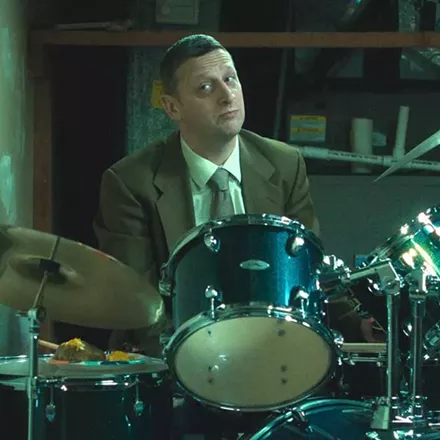Damn These Heels Queer Film Festival 2023 preview
Reviews of festival features Kokomo City, Milkwater, The Mattachine Family
By Scott Renshaw @scottrenshawThis year, the Utah Film Center marks the 20th anniversary of the Damn These Heels Queer Film Festival, running Oct. 12 – 15 for in-person screenings and Oct. 15 – 22 for virtual screenings. Here's a look at a few of the highlights from the feature lineup; for full schedule and ticket information, visit damntheseheels.org
Kokomo City
There have been other recent documentaries about the trans experience, about trans sex workers, and about the experience of trans people of color, but none of them have provided this combination of aesthetic creativity and fascinating insight. Filmmaker D. Smith does profile several Black trans women sex workers—including Daniella Carter, Dominique Silver and Koko Da Doll—all of whom share anecdotes that range from funny to alarming to deeply disturbing. But Smith also gives a voice to some of the men who seek these women out, sharing perspectives that range from completely self-accepting to only grudgingly willing to acknowledge they could find a trans woman attractive. As a result, Kokomo City provides a completely unique look at the intersection of Blackness, transness and masculinity, wrestling with the particular attitudes within the Black community that can make it so difficult to for Black trans people to come out, and difficult in a different way for those who are attracted to them to acknowledge it openly. And to top it all off, Smith employs her black-and-white cinematography for arresting images that allow her subjects to be presented as vibrant and beautiful. You may come away with crucial fresh insight—about why some kinds of sex work exist, about those who live in their truth and those who don't, and about the complexity of a community that can see gender with the same kind of blinders with which the rest of American society sees race.
Milkwater
While the potential for quirky-character-comedy overload is written all over the premise for writer/director Morgan Ingari's debut feature, it evolves instead into a charmer filled with real emotion, largely thanks to a terrific lead performance. Molly Bernard plays Milo, an over-educated and under-employed New York 30-something who meets single gay 50-something Roger (Patrick Breen) at a bar—and when she learns of his difficulties being able to have a baby, she semi-impulsively offers to serve as his surrogate. Ingari folds Milo's choice into her sense needing a purpose, but also into a character study of a woman shaped by family tragedy into someone a bit emotionally stunted by neediness. And while that could have made for an unlikeable central character, Bernard gives Milo's vulnerability a winning charisma, avoiding the potential weirdness of her friendship with Roger seeming like a manifestation of daddy issues. Milo's own burgeoning romance with a handsome musician (Ade Otukoya) never quite feels as effectively developed as Milo's interactions with her mostly-gay friend cohort, and in a sense the arc of the narrative feels somewhat predetermined. It helps when a formula has strong ingredients, and a protagonist whose restlessness plays genuinely interesting, rather than irritating.
The Mattachine Family
The spouse team of director Andy Valentine and screenwriter Danny Valentine draw from personal experience for a somewhat sentimental but still affecting story of all the different ways queer folk can now think about creating families. L.A.-based photographer Thomas (Nico Torotella) and his actor husband Oscar (Juan Pablo Di Pace) are still recovering from having their year-long time as foster parents end with their foster child returning to his birth mother—and while Oscar is away filming in another state, Thomas wrestles with what he wants next, and if that involves fatherhood. The Valentines populate their tale with a charming supporting cast—including Emily Hampshire and Jake Choi as Thomas's best friends—while nodding to rom-com history with a surprising number of When Harry Met Sally ... touchstones. It's all very openly emotional and occasionally too literal in handing Thomas voice-over monologues about his life and the lives of his cohorts, but The Mattachine Family finds something genuine in exploring a generation of gay Americans confronting choices that their predecessors (as exemplified by the title's reference to the pioneering Southern California gay-rights group The Mattachine Society) could never have imagined possible.
More by Scott Renshaw
-
Writer of the Lost Oligarch
The Phoenician Scheme gets both silly and serious about what makes rich dickheads tick.
- Jun 4, 2025
-
Film Reviews: New Releases for May 30
Karate Kid Legends, Bring Her Back, Jane Austen Wrecked My Life, Bad Shabbos, Tornado
- May 29, 2025
-
JANE AUSTEN WRECKED MY LIFE, BRING HER BACK, June 2025 Special Screenings
Two new releases, plus SLFS Summer Showdown, Wild & Scenic Festival and more.
- May 28, 2025
- More »
Latest in Film Reviews
Readers also liked…
-
Sundance 2025 wrap-up plus February special screenings
Uncertainty about the future location shifts focus away from the movies
- Feb 5, 2025











